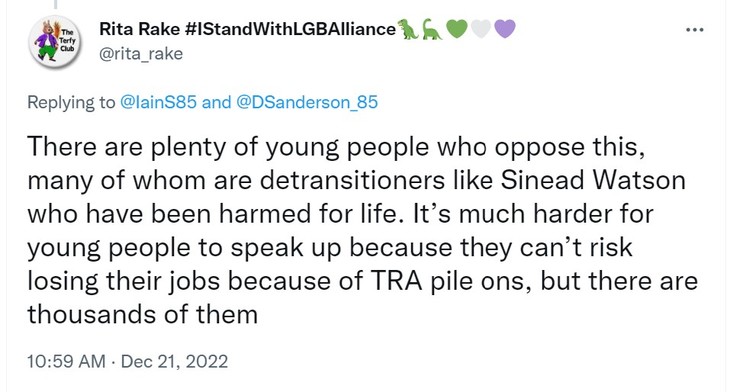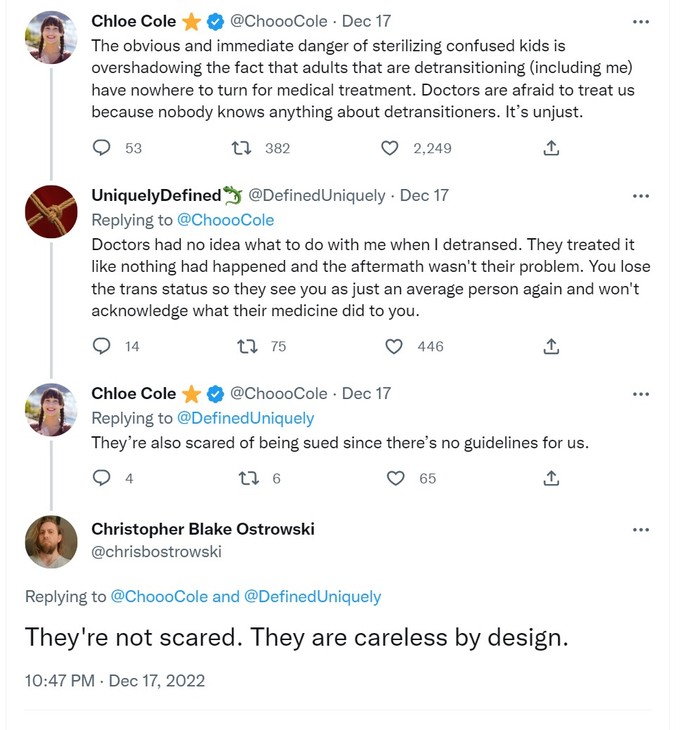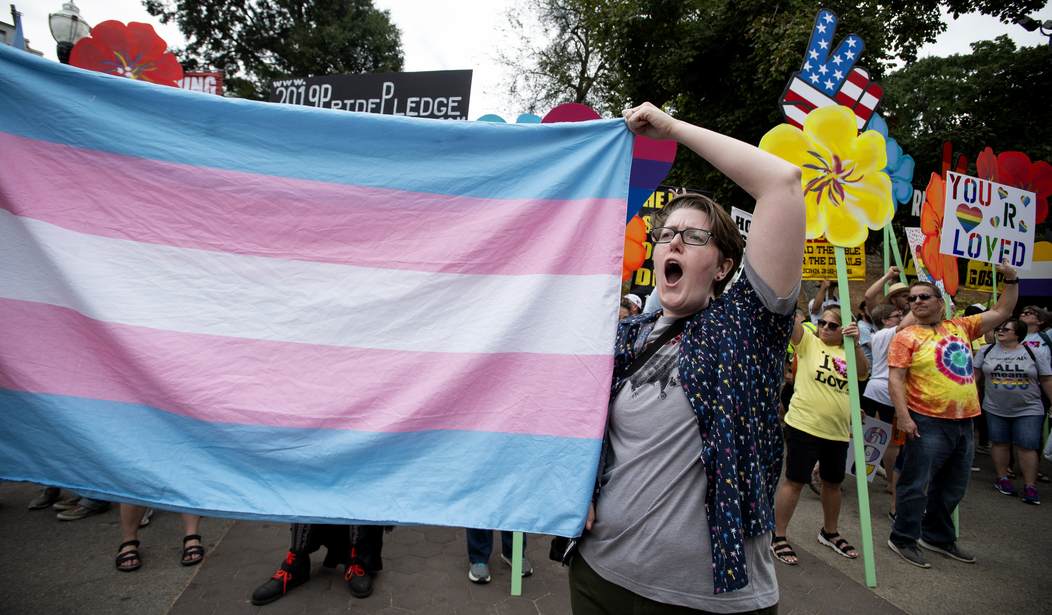In the vicious circle that discussing “trans” anything has become, the one group that faces the vilest and most hateful attacks are the people who have actually transitioned and spoken publicly about reversing that decision.
Trans Community always preaches about how Visibility and Acceptance Saves Lives.
Ok, so how come they deny the existence and visibility of DETRANSITIONERS? So many are driven to the edge because their existence is denied and they lack any support. #Hypocrites 🤯
— Oli London (@OliLondonTV) December 22, 2022
As soon as a detransitioner “comes out” in public, whether to highlight their own story or in opposition to proposed legislation due to their own experiences – perhaps not even on so large a forum as a media platform like Tucker Carlson – the transgender lobby swarms immediately and dogpiles them into shame and silence.

Maybe that’s why “gender experts” have such a hard time imagining someone who would be thrilled with their new selves.
A witness in the House hearing on "anti-LGBT violence" is asked about de-transitioners:
"I've never heard of a case of anyone de-transitioning so I honestly don't think it's a real thing." pic.twitter.com/G2ujamy9AF
— Greg Price (@greg_price11) December 14, 2022
It’s hard to be any more dismissive than “I don’t believe it’s a real thing.”
Or do they choose not to believe or hear about it because they are so invested in the transgender movement, and the money to be made from the gender identity “crisis” of America’s confused youth, that they are mystified – and threatened – by even the hint that transitioning might not be the rainbows and roses panacea they insist it is? Nor, most assuredly, do they want anyone made aware that transitioning is NOT the court of first resort. Would ruin the whole scam if word got out, wouldn’t it?
So it was interesting finding this piece this morning on a fellow named Dr Kinnon MacKinnon – transgender himself – and how he came to be, I’d guess you could say “red-pilled” regarding detransitioners.
Why detransitioners are crucial to the science of gender care
…MacKinnon, a 37-year-old transgender man and assistant professor of social work at York University here, thought it was offensive to talk about people who transitioned, later regretted their decision, and detransitioned. They were too few in number, he figured, and any attention they got reinforced to the public the false impression that transgender people were incapable of making sound decisions about their treatment.
“This doesn’t even really happen,” MacKinnon recalled thinking as he listened to an academic presentation on detransitioners in 2017. “We’re not supposed to be talking about this.”
To his credit and in spite of the aversion of the trans community at large, he started asking questions and looking for people who’d experienced this reversal.
…In the past year, MacKinnon and his team of researchers have talked to 40 detransitioners in the United States, Canada and Europe, many of them having first received gender-affirming medical treatment in their 20s or younger. Their stories have upended his assumptions.
…In his continuing search for detransitioners, MacKinnon spent hours scrolling through TikTok and sifting through online forums where people shared their experiences and found comfort from each other. These forays opened his eyes to the online abuse detransitioners receive – not just the usual anti-transgender attacks, but members of the transgender community telling them to “shut up” and even sending death threats.
“I can’t think of any other examples where you’re not allowed to speak about your own healthcare experiences if you didn’t have a good outcome,” MacKinnon told Reuters.
Gathering all his data from extensive personal interviews and research into the interactions online, he tried to organize a symposium to both present his team’s findings and make a case for including every much as health care and support for detransitioners as there was already in place for those who think they want to transition.
The pushback was immediate.
The “gender-affirming” care cabal won’t stand for anything that interferes with the social and financial juggernaut it’s creating.
In the world of gender-affirming care, as well as in the broader transgender community, few words cause more discomfort and outright anger than “detransition” and “regret.” That’s particularly true among medical practitioners in the United States and other countries who provide treatment to rising numbers of minors seeking to transition.
They insist, as MacKinnon once did, that detransitioning is too rare to warrant much attention, citing their own experiences with patients and extant research to support their view.
When someone does detransition, they say, it’s almost never because of regret, but rather, a response to the hardship of living in a society where transphobia still runs rampant.
Get that? You couldn’t possibly “regret” being pushed into irrevocable mutilation of your body and its chemistry at a young age or when your mental state was fragile. No, no, no. In fact, you actually were carved into the person you were meant to be, but ee-ville transphobes ruined it for you.
The explanation couldn’t be simpler, no?
These people are demonic. Mengele had nothing on them.
Take this monster doctor who works on children, for example. The terminology bothers him. “Detransitioning” is troublesome?
…“Stories with people who have a lot of anger and regret” about transitioning are over-represented in the media, and they don’t reflect “what we are seeing in the clinics,” said Dr Jason Rafferty, a pediatrician and child psychiatrist at Hasbro Children’s Hospital in Providence, Rhode Island. He also helped write the American Academy of Pediatrics’ policy statement in support of gender-affirming care. Detransitioning is a “very invalidating term for a lot of people who are trans and gender-diverse,” Rafferty said.
No doubt because it affects his bottom line on top and bottom surgery referrals.
…Dr Laura Edwards-Leeper, a clinical psychologist in Oregon who treats transgender youths and a co-author of WPATH’s new Standards of Care for adolescents and children, said MacKinnon’s work represents some of the most extensive research to date on the reasons for detransitioning and the obstacles patients face. She said the vitriol he has encountered illustrates one reason so few clinicians and researchers are willing to broach the subject.
“People are terrified to do this research,” she said.
God forbid someone has the intestinal fortitude to do the right thing in this day and age. It’s only children’s lives you’re saving. It’s only the lives and future health of those who’ve already been led down the primrose path and are desperate to undo whatever they can of the most monstrous mistake of their lives.
But once you’ve detransitioned, it’s like you’ve left a secret club but the door’s slammed shut on your finger. And the tender-hearted gender-affirming care and trans types are damn well going to leave you stuck there in the jamb to freeze to death..so you shut up.
The last tweet is correct – it’s by design.

The stories in the article are so horribly sad, and my God – the pressure on parents from Medical Professionals™ is utterly unconscionable. One emotionally distraught teen’s experience with fanatics at the University of Minnesota is gut-wrenching…
…She was horrified at her body, could not look down in the shower and felt “absolute dread at the time of menstrual cycle,” the records note.
“I felt so strongly. I thought nothing would change my mind,” Lazzara told Reuters.
Clinicians at the university warned families that their children were suicidal “because they are born in the wrong bodies,” Lazzara’s mother, Lisa Lind, told Reuters.
“I thought, ‘I’ll do whatever it takes, so she doesn’t kill herself.’”
…Lazzara started taking testosterone in the fall of 2012, at age 16. She was still binding her breasts – so tightly, she said, that her ribs deformed. After a man groped her on the street, she decided to have breast-removal surgery, tapping the college fund her grandmother had left for her to cover the nearly $10,000 cost.
And now?
…Lazzara told Reuters she now realizes that gender treatment was not appropriate for her and that it took a toll on her physical and mental health. “I do wish my doctors had said to me, ‘It’s OK to feel disconnected from your body. It’s OK to like girls. It’s OK to be gender non-conforming.’”
…Lazzara recently found the before-and-after pictures of her torso on the website of the surgeon who performed her mastectomy in 2013. She had given him permission to post the images because he was proud of the outcome. Seeing her body as it once was stunned her. “I saw my breasts before I got them removed.
That’s my 16-year-old body,” she said. “I had no ability at that age to be in my own body in my own way.”
And all her tight friends in the trans community have moved along. There are more of those heart-wrenchers. They will make you so angry.
It’s poisonous for detransitioners because they aren’t advancing the narrative, they are no longer the living embodiment of the plan, the gender-affirming poster children, and they are threatening to upend the works. In many of the Twitter threads I went through, the vitriol and bitter venom was unbelievable, and so much “How dare you give people like Matt Walsh ammunition!! Shut up and die!” Just lunatic fringe vituperative rantings.
Allowing McKinnon to have his team’s work showcased in a thoughtful piece and then the Reuters reporters – to their great credit – actually doing journalism, researching and interviewing both sides, makes for compelling reading. They may not have realized what they published. It also makes a forceful statement against allowing childhood gender interventions, assisted by the interviews with those in the business of promoting and advocating for such. Almost to a one, they come across as the soulless monsters we always thought they had to be.








Join the conversation as a VIP Member